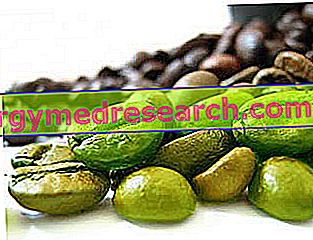Generality
Hypoglycemia is the rapid lowering of blood glucose concentration. It is the most frequent of the acute complications of pharmacologically treated diabetes and can lead to a series of dangerous consequences.

Hypoglycaemia is more common in the interval between meals and at night. The main reasons why it occurs include: failure to comply with timetables and the type of diet, unforeseen and tiring physical activity, insulin or oral hypoglycemic agents taken in excessive quantities.
What's this
There is talk of low blood sugar, hypoglycemia or hypoglycemia when blood glucose levels fall below 60-70 mg / dl.
Blood glucose regulation
Glucose is an essential nutrient for our body, a bit like gasoline for the car. For this reason, in the healthy subject the glycaemia (concentration of glucose in the blood) is kept relatively constant by the intervention of articulated compensatory mechanisms (insulin, glucagon, etc.).
The greatest glycemic fluctuations occur after a large meal (hyperglycemia) and after prolonged fasting (hypoglycemia). In the latter case the tendency to glycemic reduction is countered by:
- Release of glucose contained in liver reserves (glycogen);
- Conversion of some amino acids to glucose;
- Use of lipids to satisfy energy demands normally covered by sugars.
These and other compensatory interventions are mediated by a fine hormonal regulation system, which sees the main actor in the glucagon.
The combination of these events is intended to keep the blood sugar level high enough to ensure optimal functioning of nerve cells and other dependent glucose tissues.
Normal values
We speak of HYPOGLYCAEMIA when the blood glucose level falls below the normal values:
| Fasting glucose values | (Mg / dl) | (Mmol / L) |
NORMAL | 70-99 | 3.9 - 5.5 |
Altered (IFG) | 100-125 | > 5.5 - <7.0 |
Diabetes | > 126 | > 7.0 |
* During the day, oscillations ranging from 60 to 160 mg / dl are considered normal.
Symptoms
To learn more: Hypoglycemia - Causes and Symptoms »
Hypoglycemia is a condition generally perceived by the subject, especially when it falls below 50 mg per 100 ml. This condition in fact causes the release of a series of hormones which, after the appearance of a general sense of weakness due to the suffering of the central nervous system, stimulate the body to react.
Thus the appearance of symptoms such as:
- Tremors;
- Palpitations;
- Intense hunger;
- Pallor;
- drooling;
- Convulsions;
In medium-sized crises they can manifest themselves:
- Weakening of sight;
- Headache;
- Sweating;
- Tingling.
- Difficulty concentrating;
- Poor lucidity;
- Drowsiness;
- Irritability;
- Changes in behavior;
- Anxiety.
In the most serious cases, we can go as far as losing consciousness.

If left untreated, hypoglycaemia can lead to hypoglycemic coma, which generally appears when the blood glucose concentration falls below 20 mg / dl.
The appearance of the classic symptomatology is however linked, in addition to the absolute value of the blood sugar, to the individual tolerance and to the speed with which the glycemic rate is lowered. The more the drop is sudden and the easier the onset of the symptoms described above will be, even with blood glucose levels close to the norm.
Warning! When the first symptoms associated with hypoglycemia appear, prompt action is required. If the diabetic person is not able to face the situation alone, it is good that he asks for help from those around him, so that he can intervene in his place.
First, if possible, capillary blood glucose should be measured. It is necessary to stop, then, any activity, sit down and take 15 grams of simple sugars (eg a glass of fruit juice, some candy, a sachet and a half of sugar dissolved in water, etc.) to immediately increase the blood sugar level. In general, recovery takes about 10-15 minutes .
If the subject is confused or unconscious, it is recommended not to try to make him swallow, as the food could end up in the trachea, obstructing breathing. In the event of an altered state of consciousness, glucagon, a hormone able to increase blood sugar, can be administered by injection (note: this emergency kit is available in pharmacies and is easy to use). If this solution is not available, an ambulance should be called immediately so that medical personnel can administer glucose intravenously.
Hypoglycemia - Causes
The etiological agents underlying this condition can be numerous and numerous.
In most cases, hypoglycemia is supported by a disease :
- Adrenal insufficiency
- Liver disease
- Sepsis
- Hormonal imbalances
- Pancreatic cell tumor responsible for insulin secretion
- Other non-beta cellular forms of cancer
or, in patients with diabetes mellitus, it may be caused by the incorrect intake of oral hypoglycemic drugs and / or insulin.
In some cases, hypoglycemia can be the result of a poor diet . For example, in the case of prolonged fasting followed by rapid reintroduction of sugars, the so-called "reactive" hypoglycemia occurs, caused by an insulin hypersecretion.
Even a strict diet, low in carbohydrates, fructose intolerance, or a particularly prolonged physical activity (attention to morning workouts, practiced on an empty stomach to promote weight loss), can cause hypoglycemia.
What happens in diabetics
The hypoglycemic crisis occurs more frequently in patients treated with insulin, sulfonylureas and glinids (drugs that stimulate the pancreas to produce insulin). This complication is rare, however, in patients treated with metformin (an oral medicine used to manage type 2 diabetes).
In diabetic patients, the factors that can predispose to a hypoglycemic crisis are:
- Taking too much insulin or oral medications to stimulate the pancreas release;
- Missed meal intake or consumption of an insufficient amount of food, especially carbohydrates, after taking insulin or tablets;
- Performing a particularly strenuous physical activity;
- Excessive alcohol consumption (especially on an empty stomach).
Sometimes hypoglycemic crises can occur without obvious causes.
What happens in healthy people
Although the body is able to avoid hypoglycemia even in conditions of prolonged fasting, in special cases even in people who do not have diabetes, glucose levels in the blood can fall too low.
The most frequent case is that of young women who experience symptoms of reduced blood sugar (weakness, sense of hunger, difficulty concentrating, etc.) late in the morning, especially after a breakfast with many simple sugars.
Furthermore, hypoglycemia can depend on:
- Alcohol abuse;
- Surgical interventions at the gastrointestinal level, which modify glucose absorption;
- Illnesses.
Treatment
See also: Hypoglycemia medications »
Hypoglycemia is an acute situation that must be treated quickly.
In mild forms it is sufficient to consume foods with a high glycemic index (sugar, honey, candy, etc.). However, we must not forget to also take carbohydrates with a moderate glycemic index (fruit, whole grains, etc.), in order to avoid reactive hypoglycemia.
Subdividing the caloric intake, adding a couple of snacks to the three main meals, is a useful strategy for those who suffer from functional hypoglycemia not linked to particular pathologies. The most suitable diet for these individuals is also based on the reduction of sugars (sweets, snacks, pastry products, bananas, raisins, etc.) in favor of wholegrain and high protein foods.
In case of severe hypoglycemia with an unconscious patient (a fairly frequent situation in diabetic patients treated with insulin), an intramuscular injection of glucagon or intravenous glucose is required.
Advice to prevent a hypoglycemic crisis
Diabetic patients
- Never skip meals, especially breakfast;
- Half an hour before engaging in a sporting activity take a snack (for example, with an apple or half a banana);
- Don't abuse alcohol;
- Avoid prolonged fasting;
- Always carry some food rich in sugars (eg candies, sugar in sachets, etc.);
- Inform family members, friends and co-workers about how to recognize hypoglycemic crises and how to intervene in such situations;
- Learn to recognize the warning signs of hypoglycemia and check your blood sugar if you experience unusual symptoms.
To learn more: Diet Against Hypoglycemia »
Healthy people
If the state of hypoglycemia depends on physiological and not pathological causes, as soon as you feel unwell it is sufficient to drink or eat a sweet food (honey, candies, orange juice, etc.). After this remedy, the body should recover quickly (usually within 15 minutes).
If the disorder persists or the seizures become more frequent, it is advisable to consult a doctor to investigate the possible causes.



